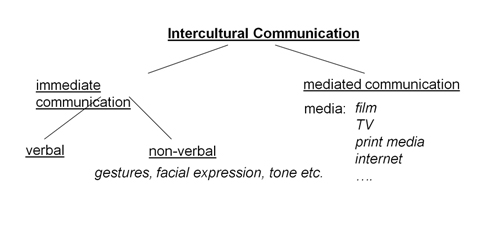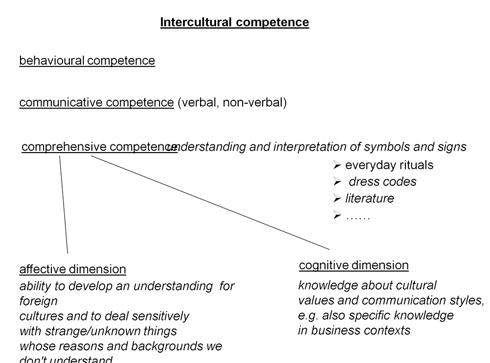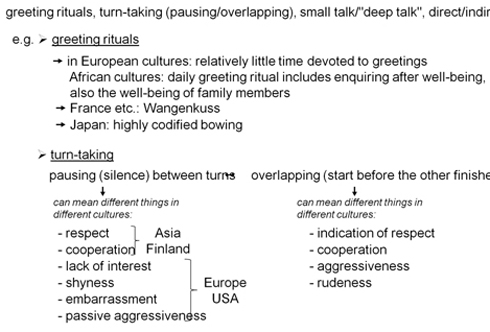Intercultural communication pitfalls
Vorschau:


Intercultural communication pitfalls (Wahrnehmungsfallen)
- different meanings of words/terms
- divergence: conventions of speech ? intention
- communication styles
- topics
- register/tone
- paraverbal factors
- non-verbal factors
- specific cultural standards
- specific cultural conventions
1. Different meanings of words/terms
e.g. frz. "famille" → extended family, relatives
"nation" → in different cultures with positive or negative connotations
2. Divergence conventions of speech ↔ intention
acceptance/refusal is often not expressed clearly
e.g.
invitation in France : "Est-ce que je peux vous inviter à déjeuner demain?"
convention: "Oui, si vous voulez." → sounds non-obligatory (unverbindlich)
→ correct meaning: "Yes, thank you!"
business negotiations in Asia
statement of the Asian partner: "I'll do the best I can ."
→ correct meaning: break-off of negotiations without any solution
3. Communication styles


direct
↔
indirect
→ degree of directness in which statements are made
refers especially to:
requests
→ typical British request if music is too loud : "I think the walls are rather thin here"
- expression of individual opinions/attitudes
- apologizing (Asian Countries→ fear a loss of face)
direct German way to express criticism, to contradict etc. is not appreciated everywhere
→ see also: Hall: high context vs. low context
4. topics
e.g.
→ Japan: topics concerning 'money', 'taste', 'personality', 'body' are avoided
→ Frankreich: - no advertising for tampons or certain other medical products
- conversational topics: politics, scandals
→ Spain/Italy: football, family matters
→ Turkey: family, job, football – avoid: politics
5. register/tone (richtiger Ton)
e.g. humor/irony/sarcasm
→ often used to find an additional common level of understanding
but: may often be misinterpreted
6. paraverbal factors
→ loudness, intonation, pitch, tone, rhythm, tempo etc.
e.g.:
- Asian intonation falls with polite question
↔
European interpretation:impolite
- German loudness is mostly considered impolite/rude
7. non-verbal factors
gestures, facial expressions, eye contact, etiquette, dress codes etc.
8. additional/specific cultural standards and attitudes in certain cultures
- France: sense of honour, solidarity, rationalism (believe in progress/technology)
- China: Confucian principles (strict hierarchy, group harmony, politeness, strong work ethic)
9. other specific cultural conventions
e.g:
- GB/USA: first names also for superiors
- Britain: staring at other people is rude
→ danger: may be misinterpreted
Dokument
herunterladen
[.ppt][380 KB]
